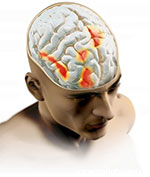 A comprehensive behavioral intervention is more effective than supportive therapy and education in helping adults control the tics associated with Tourette syndrome, according to an NIMH-funded study published in the August 2012 issue of the Archives of General Psychiatry. The study follows a previous study involving children with the disorder, which showed similar results.
A comprehensive behavioral intervention is more effective than supportive therapy and education in helping adults control the tics associated with Tourette syndrome, according to an NIMH-funded study published in the August 2012 issue of the Archives of General Psychiatry. The study follows a previous study involving children with the disorder, which showed similar results.
Tourette syndrome (TS) is a chronic neurological disorder associated with motor or vocal tics that can be disruptive and difficult to control. Tics begin in childhood, typically peak in early adolescence and often decrease by adulthood. For some adults, the tics persist and can be difficult to control. Many individuals with TS describe an unwanted urge or sensation prior to the tic that is relieved by performing the tic. TS is commonly treated with an antipsychotic medication such as pimozide or risperidone. But these medications rarely eliminate tics entirely and can cause troubling side effects such as weight gain and sedation. Because of these adverse side effects, many patients decline or discontinue use of these medications. Until now, few large-scale studies have examined the effectiveness of behavioral interventions for TS.
A team of investigators from Massachusetts General Hospital/Harvard Medical School; Yale University; University of Texas Health Science Center at San Antonio; University of California, Los Angeles; the University of Wisconsin-Milwaukee; Johns Hopkins Medical Institutions; and the Tourette Syndrome Association tested the effectiveness of a Comprehensive Behavioral Intervention for Tics (CBIT), a therapy based on habit reversal training that includes two concepts:
- Tic-awareness training, which teaches how to recognize early signs that a tic is about to occur, and
- Competing-response training, which teaches how to engage in a voluntary behavior that is physically incompatible with the impending tic. For example, a person feeling an urge to jerk his or her shoulder may be taught to tense arm muscles while pushing the elbow against the torso (a competing response). This combination of awareness training and competing response training is intended to disrupt the cycle of premonitory urge and performance of the tic.
The researchers randomized 122 adults at three research centers to either CBIT or a control treatment that included supportive therapy and education about TS. Each group received eight sessions over a 10-week period. Those who responded to therapy were assessed three months and six months after the end of the study period to determine if the therapy’s benefits persisted.
Results of the Study
Overall, 38 percent of patients receiving CBIT showed significant symptom improvement compared to 6 percent receiving the control treatment. The results complement the earlier CBIT study in children, which found that 52 percent of the children who received CBIT showed significant symptom improvement compared to 18.5 percent receiving the control treatment.
About 62.5 percent of those who responded to CBIT in the trial returned for follow-up assessments at three and six months. About 80 percent of the returning participants continued to show a positive response to CBIT, indicating the treatment has enduring benefits for a significant group. In comparison, about 50 percent of those who responded to the control treatment returned for post-treatment assessment, and only about 25 percent of those continued to show benefits after six months.
Significance
Given the limited medication options for treating TS and the adverse effects associated with the antipsychotic medications, CBIT provides an alternative treatment to manage tics in children and adults. However, the positive response among adults was lower than among the children. The researchers suggest that people with tics that persist into adulthood may have a more chronic form of the disorder that is more difficult to treat.
What Is Next
Future research focused on CBIT may uncover the role of behavioral learning in reducing the involuntary movements and tics associated with TS. In the meantime, the researchers are working with the Tourette Syndrome Association and the Centers for Disease Control and Prevention to disseminate this intervention by offering training workshops to clinicians around the country.
Material adapted from NIMH.
Reference
Wilhelm S, Peterson AL, Piacentini J, Woods DW, Deckersbach T, Sukhodolsky DG, Chang S, Liu H, Dziura J, Walkup JT, Scahill L. Randomized trial of behavior therapy for adults with Tourette syndrome. Archives of General Psychiatry. 2012 August.
Hi Christopher Fisher,
Very nice blog shared on this website. Behavioral Therapy Can Limit Tics In Adults With Tourette Syndrome. I really like this blog. Thanks a lot for revealing your blog.